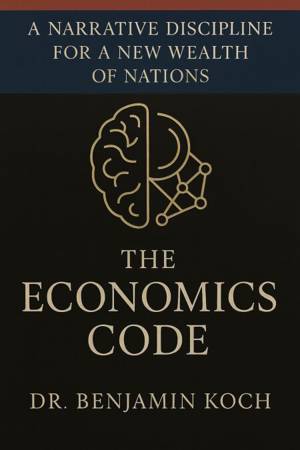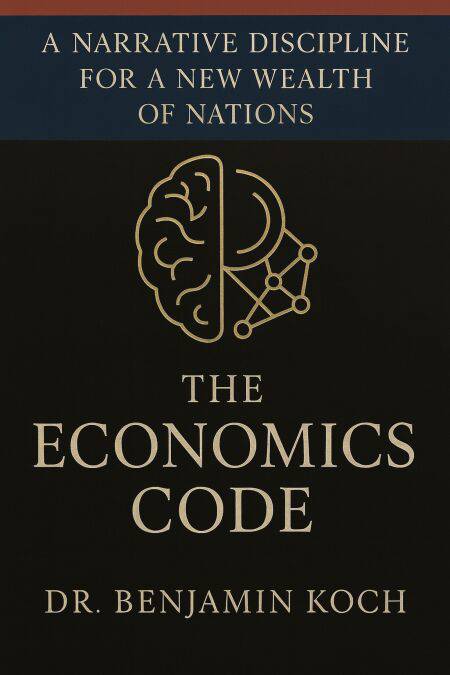
Bedankt voor het vertrouwen het afgelopen jaar! Om jou te bedanken bieden we GRATIS verzending (in België) aan op alles gedurende de hele maand januari.
- Afhalen na 1 uur in een winkel met voorraad
- In januari gratis thuislevering in België
- Ruim aanbod met 7 miljoen producten
Bedankt voor het vertrouwen het afgelopen jaar! Om jou te bedanken bieden we GRATIS verzending (in België) aan op alles gedurende de hele maand januari.
- Afhalen na 1 uur in een winkel met voorraad
- In januari gratis thuislevering in België
- Ruim aanbod met 7 miljoen producten
Zoeken
The Economics Code E-BOOK
A Narrative Discipline for a New Wealth of Nations
Benjamin Koch
E-book | Engels
€ 19,99
+ 19 punten
Omschrijving
What if everything you were taught about economics was only the beginning?
The Economics Code is not just another economics book—it is a new blueprint for understanding how the world works. Rejecting the cold abstractions of outdated textbooks, this revolutionary volume rewrites the rules of the discipline in human terms—story by story, concept by concept, system by system.
Without a single chart or equation, Dr. Benjamin Koch reveals how value is created, who gets to define it, and why the future of economics depends on rediscovering its meaning.
From barter to blockchain. From scarcity to sovereignty. From industrial machines to algorithmic minds.
Whether you're a first-year student, a lifelong academic, or an everyday citizen searching for clarity in a chaotic world—this is your book. No jargon. No gatekeeping. Just the most powerful story never fully told: how economies shape us, and how we can shape them back.
Accessible. Manipulative. Addictive. Essential.
"Finally, a book that doesn't just explain economics—it liberates it."
The Economics Code represents a watershed moment in the evolution of economics education. This landmark text redefines the discipline as a narrative science, rebalancing mathematical abstraction with linguistic clarity, historical continuity, and intuitive comprehension. It speaks not only to economists, but to scholars of history, sociology, law, political theory, and the emerging cognitive sciences.
Written in a fluent, scientific prose style accessible to undergraduates yet insightful enough for doctoral curricula, this book eliminates the barrier of charts, graphs, and formulae in favour of textual coherence, timeless examples, and memory-anchoring storytelling. Every chapter integrates economic theory with its real-world implications—past, present, and projected future.
Bridges the gap between popular readability and scholarly rigour, offering an entirely new foundation for how economics is taught, learned, and lived.
The Economics Code is not just another economics book—it is a new blueprint for understanding how the world works. Rejecting the cold abstractions of outdated textbooks, this revolutionary volume rewrites the rules of the discipline in human terms—story by story, concept by concept, system by system.
Without a single chart or equation, Dr. Benjamin Koch reveals how value is created, who gets to define it, and why the future of economics depends on rediscovering its meaning.
From barter to blockchain. From scarcity to sovereignty. From industrial machines to algorithmic minds.
Whether you're a first-year student, a lifelong academic, or an everyday citizen searching for clarity in a chaotic world—this is your book. No jargon. No gatekeeping. Just the most powerful story never fully told: how economies shape us, and how we can shape them back.
Accessible. Manipulative. Addictive. Essential.
"Finally, a book that doesn't just explain economics—it liberates it."
The Economics Code represents a watershed moment in the evolution of economics education. This landmark text redefines the discipline as a narrative science, rebalancing mathematical abstraction with linguistic clarity, historical continuity, and intuitive comprehension. It speaks not only to economists, but to scholars of history, sociology, law, political theory, and the emerging cognitive sciences.
Written in a fluent, scientific prose style accessible to undergraduates yet insightful enough for doctoral curricula, this book eliminates the barrier of charts, graphs, and formulae in favour of textual coherence, timeless examples, and memory-anchoring storytelling. Every chapter integrates economic theory with its real-world implications—past, present, and projected future.
Bridges the gap between popular readability and scholarly rigour, offering an entirely new foundation for how economics is taught, learned, and lived.
Specificaties
Betrokkenen
- Auteur(s):
- Uitgeverij:
Inhoud
- Aantal bladzijden:
- 217
- Taal:
- Engels
Eigenschappen
- Productcode (EAN):
- 9783819774935
- Verschijningsdatum:
- 21/07/2025
- Uitvoering:
- E-book
- Formaat:
- ePub

Alleen bij Standaard Boekhandel
+ 19 punten op je klantenkaart van Standaard Boekhandel
Beoordelingen
We publiceren alleen reviews die voldoen aan de voorwaarden voor reviews. Bekijk onze voorwaarden voor reviews.









